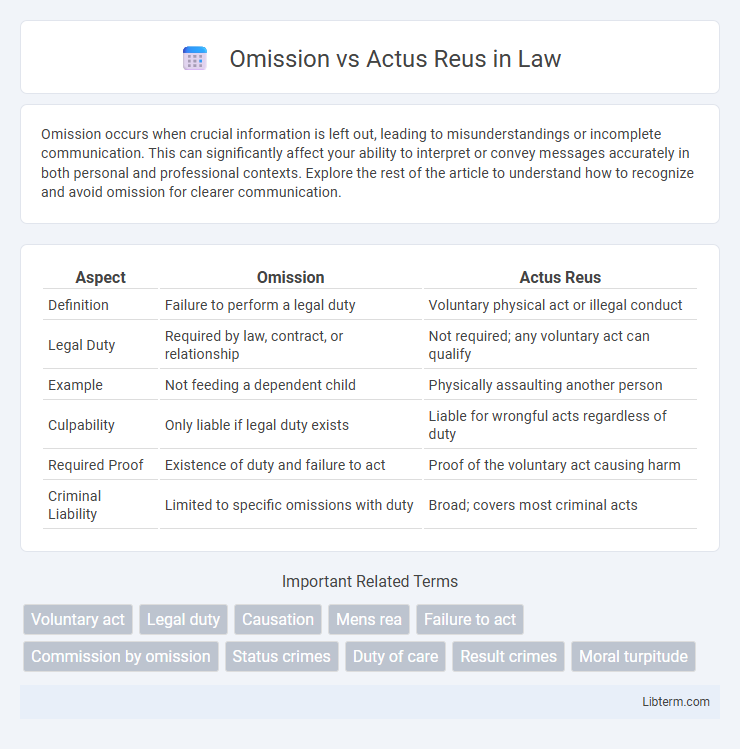Omission occurs when crucial information is left out, leading to misunderstandings or incomplete communication. This can significantly affect your ability to interpret or convey messages accurately in both personal and professional contexts. Explore the rest of the article to understand how to recognize and avoid omission for clearer communication.
Table of Comparison
| Aspect | Omission | Actus Reus |
|---|---|---|
| Definition | Failure to perform a legal duty | Voluntary physical act or illegal conduct |
| Legal Duty | Required by law, contract, or relationship | Not required; any voluntary act can qualify |
| Example | Not feeding a dependent child | Physically assaulting another person |
| Culpability | Only liable if legal duty exists | Liable for wrongful acts regardless of duty |
| Required Proof | Existence of duty and failure to act | Proof of the voluntary act causing harm |
| Criminal Liability | Limited to specific omissions with duty | Broad; covers most criminal acts |
Understanding Actus Reus: The Foundation of Criminal Liability
Actus reus, the fundamental element of criminal liability, constitutes the physical act or unlawful omission that breaches a legal duty, directly linking conduct to criminal responsibility. Unlike mere thoughts or intentions, actus reus requires a voluntary action or failure to act when legally obligated, establishing the tangible basis for prosecution. Understanding the distinction between omissions and positive acts within actus reus clarifies when a defendant's conduct meets the threshold of criminal liability.
Defining Omission in Criminal Law
Omission in criminal law refers to the failure to act when there is a legal duty to do so, distinguishing it from actus reus which involves a positive act. Legal duties arise from statutes, contracts, relationships, or voluntary assumption of care, making omission punishable only when such duty exists. The concept highlights that liability depends on the breach of an established obligation rather than mere inaction.
Key Differences Between Omission and Actus Reus
Omission refers to the failure to perform an act when there is a legal duty to do so, while actus reus encompasses all voluntary physical actions or conduct that constitute a criminal offense. The key difference lies in the fact that actus reus involves positive conduct, whereas omission involves a lack of action despite an obligation. Legal liability arises from actus reus through voluntary acts, but in omission cases, liability depends on the presence of a specific duty to act.
Legal Duty: When Does Omission Become a Crime?
Omission becomes a crime when there is a legal duty to act, creating a breach through failure to fulfill that duty. Legal duties arise from statutes, contracts, relationships, or voluntary assumption of care, making the omission equivalent to the actus reus. Courts assess the existence of a duty and causation of harm to determine criminal liability for omissions.
Common Law vs Statutory Approaches to Omission
Common law typically restricts liability for omissions to specific duties such as contractual obligations, relationships, or assuming care, whereas statutory approaches often expand duties to act, codifying broader responsibilities to prevent harm. In common law, omission liability requires a pre-existing duty, while statutes may impose independent duties, creating offenses for failure to act regardless of prior relationship. These statutory provisions reflect a more proactive legal framework, emphasizing public safety and mandatory intervention.
Illustrative Case Laws: Omission and Criminal Responsibility
Omission involves failure to act when there is a legal duty, while actus reus requires a positive act causing harm. In *R v. Stone and Dobinson* (1977), omission to care resulted in criminal liability, highlighting the duty arising from assumed care. *R v. Gibbins and Proctor* (1918) further illustrates omission where parental neglect led to a child's death, establishing omission as sufficient for actus reus under specific duties.
The Role of Causation in Omission and Actus Reus
Causation plays a critical role in distinguishing omission from actus reus by establishing a direct link between the defendant's conduct or failure to act and the resulting harm. In actus reus, the defendant's voluntary act typically causes the prohibited consequence, fulfilling the causation requirement. In cases of omission, legal liability arises when there is a specific duty to act and the failure to fulfill that duty directly causes the harm, highlighting the essential causation element in omissions.
Exceptions: When Omissions Are Not Punishable
Omissions generally are not punishable unless a legal duty to act exists, such as in cases involving statutes, contracts, special relationships, or voluntary assumption of care. Exceptions include failure to file taxes, reporting child abuse, or providing necessities to dependent family members, where the law explicitly mandates action. Courts often distinguish between moral obligations and legal duties, holding individuals liable only when the omission breaches a specific duty outlined by law.
Debates and Criticisms: Omission in Modern Criminal Law
Omission in modern criminal law sparks ongoing debates about the extent to which individuals should be held liable for failing to act, with critics arguing that penalizing omissions risks undermining personal autonomy and moral culpability. The tension centers on differentiating between moral duties and legal obligations, as well as defining clear standards for when omission constitutes criminal liability. Courts and scholars continuously grapple with inconsistencies in applying omission principles, especially regarding the duty to rescue and statutory requirements, highlighting challenges in harmonizing ethical considerations with enforceable legal rules.
Practical Implications for Legal Practitioners
Omission and actus reus differentiate legal liability by defining whether a failure to act or a voluntary action constitutes a criminal offense, directly impacting case strategies for legal practitioners. Understanding jurisdiction-specific statutes on omissions helps determine if an individual's inaction meets the threshold for criminal responsibility, particularly in duties arising from relationships, contracts, or statutory obligations. Effective litigation relies on meticulously analyzing factual circumstances alongside applicable legal principles to establish whether the defendant's conduct satisfies the actus reus requirement, influencing charges and defenses in criminal proceedings.
Omission Infographic

 libterm.com
libterm.com